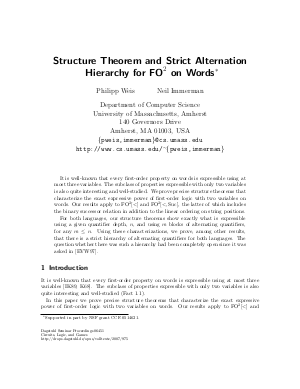Structure Theorem and Strict Alternation Hierarchy for FO² on Words
Authors Philipp Weis, Neil Immerman
-
Part of:
Volume:
Dagstuhl Seminar Proceedings, Volume 6451
Part of: Series: Dagstuhl Seminar Proceedings (DagSemProc) - License:
 Creative Commons Attribution 4.0 International license
Creative Commons Attribution 4.0 International license
- Publication Date: 2007-04-23
File

PDF
DagSemProc.06451.6.pdf
- Filesize: 273 kB
- 22 pages
Document Identifiers
Subject Classification
Keywords
- Descriptive complexity
- finite model theory
- alternation hierarchy
- Ehrenfeucht-Fraisse games
Metrics
- Access Statistics
-
Total Accesses (updated on a weekly basis)
0PDF Downloads0Metadata Views
Abstract
It is well-known that every first-order property on words is expressible using at most three variables. The subclass of properties expressible with only two variables is also quite interesting and well-studied. We prove precise structure theorems that characterize the exact expressive power of first-order logic with two variables on words. Our results apply to FO$^2[<]$ and FO$^2[<,suc]$, the latter of which includes the binary successor relation in addition to the linear ordering on string positions. For both languages, our structure theorems show exactly what is expressible using a given quantifier depth, $n$, and using $m$ blocks of alternating quantifiers, for any $mleq n$. Using these characterizations, we prove, among other results, that there is a strict hierarchy of alternating quantifiers for both languages. The question whether there was such a hierarchy had been completely open since it was asked in [Etessami, Vardi, and Wilke 1997].
Cite As Get BibTex
Philipp Weis and Neil Immerman. Structure Theorem and Strict Alternation Hierarchy for FO² on Words. In Circuits, Logic, and Games. Dagstuhl Seminar Proceedings, Volume 6451, pp. 1-22, Schloss Dagstuhl – Leibniz-Zentrum für Informatik (2007)
https://doi.org/10.4230/DagSemProc.06451.6
BibTex
@InProceedings{weis_et_al:DagSemProc.06451.6,
author = {Weis, Philipp and Immerman, Neil},
title = {{Structure Theorem and Strict Alternation Hierarchy for FO\~{A}‚\^{A}² on Words}},
booktitle = {Circuits, Logic, and Games},
pages = {1--22},
series = {Dagstuhl Seminar Proceedings (DagSemProc)},
ISSN = {1862-4405},
year = {2007},
volume = {6451},
editor = {Thomas Schwentick and Denis Th\'{e}rien and Heribert Vollmer},
publisher = {Schloss Dagstuhl -- Leibniz-Zentrum f{\"u}r Informatik},
address = {Dagstuhl, Germany},
URL = {https://drops.dagstuhl.de/entities/document/10.4230/DagSemProc.06451.6},
URN = {urn:nbn:de:0030-drops-9751},
doi = {10.4230/DagSemProc.06451.6},
annote = {Keywords: Descriptive complexity, finite model theory, alternation hierarchy, Ehrenfeucht-Fraisse games}
}
